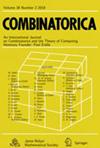傅里叶-熵-影响猜想的一个新界
IF 1
2区 数学
Q1 MATHEMATICS
引用次数: 0
摘要
本文证明了n维布尔函数f的傅里叶熵可以上界为\(O(I(f)+ \sum \limits _{k\in [n]}I_k(f)\log \frac{1}{I_k(f)})\),其中I(f)为其总影响,\(I_k(f)\)为第k个坐标的影响。对于傅里叶-最小熵-影响猜想\(O(I(f)\log I(f))\)和\(O(I(f)^2)\),我们的界与已知界之间没有严格的定量关系。证明是初等的,并使用傅里叶系数矩在不同水平上的迭代界来估计傅里叶熵作为其导数。本文章由计算机程序翻译,如有差异,请以英文原文为准。
A New Bound for the Fourier-Entropy-Influence Conjecture
In this paper, we prove that the Fourier entropy of an n-dimensional boolean function f can be upper-bounded by \(O(I(f)+ \sum \limits _{k\in [n]}I_k(f)\log \frac{1}{I_k(f)})\), where I(f) is its total influence and \(I_k(f)\) is the influence of the k-th coordinate. There is no strict quantitative relationship between our bound with the known bounds for the Fourier-Min-Entropy-Influence conjecture \(O(I(f)\log I(f))\) and \(O(I(f)^2)\). The proof is elementary and uses iterative bounds on moments of Fourier coefficients over different levels to estimate the Fourier entropy as its derivative.
求助全文
通过发布文献求助,成功后即可免费获取论文全文。
去求助
来源期刊

Combinatorica
数学-数学
CiteScore
1.90
自引率
0.00%
发文量
45
审稿时长
>12 weeks
期刊介绍:
COMBINATORICA publishes research papers in English in a variety of areas of combinatorics and the theory of computing, with particular emphasis on general techniques and unifying principles. Typical but not exclusive topics covered by COMBINATORICA are
- Combinatorial structures (graphs, hypergraphs, matroids, designs, permutation groups).
- Combinatorial optimization.
- Combinatorial aspects of geometry and number theory.
- Algorithms in combinatorics and related fields.
- Computational complexity theory.
- Randomization and explicit construction in combinatorics and algorithms.
 求助内容:
求助内容: 应助结果提醒方式:
应助结果提醒方式:


